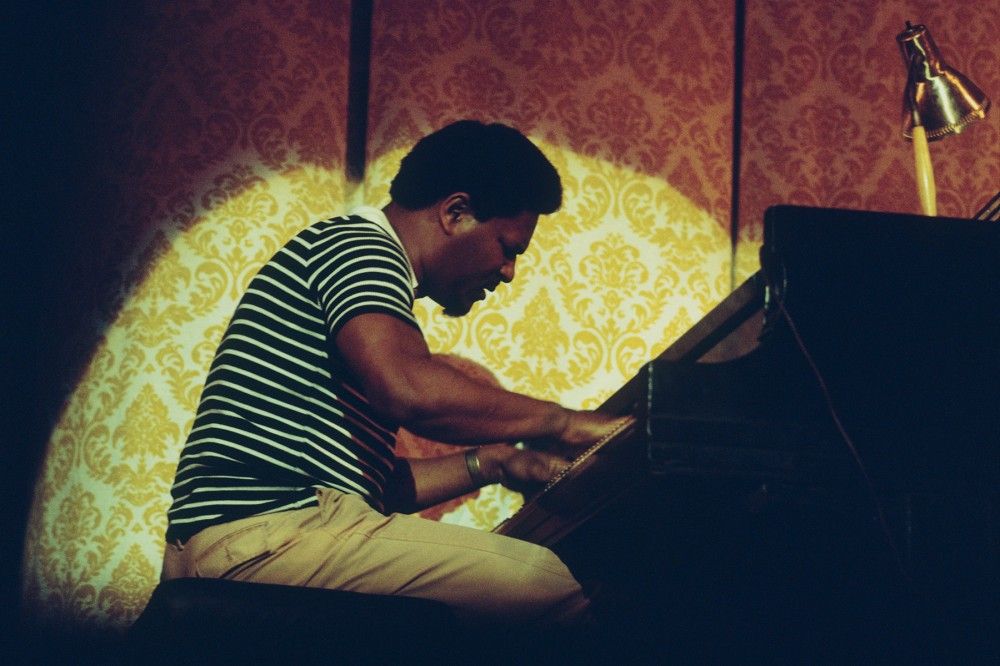
McCoy Tyner, Jazz Pianist Who Anchored John Coltrane's Legendary Quartet, Dead at 81
McCoy Tyner, one of the most distinctive and influential pianists of the past 60 years, who became best known for his work with ’s legendary 1960s quartet, died at age 81.
“It is with heavy hearts that we announce the passing of jazz legend Alfred ‘McCoy’ Tyner,” his family wrote in a statement. “McCoy was an inspired musician who devoted his life to his art, his family, and his spirituality. McCoy Tyner’s music and legacy will continue to inspire fans and future talent for generations to come.”
Tyner recorded dozens of albums as a leader from the early Sixties through 2009; appeared on classic LPs by Joe Henderson, Wayne Shorter, and Freddie Hubbard; and earned an NEA Jazz Master honor in 2002. But it was his tenure in Coltrane’s so-called “classic quartet” of the early- to mid-Sixties — the band heard on iconic albums such as A Love Supreme, Crescent, and Live at Birdland — that made him a star. His bluesy, insistent style anchored the group’s rhythm section and provided the perfect foil for Coltrane’s stratospheric flights on tenor and soprano sax.
“I like to go on an adventure when I play,” Tyner told music site Innerviews, in a 2000 interview, of his approach to improvising. “I also like to have the freedom to do that for more than just the sake of doing something ‘out there’ or different. I like to experiment and take people along the way and bring them back. It’s like a voyage.”
For Coltrane, these qualities made the pianist an ideal collaborator. “He’s sort of the one who gives me wings and lets me take off from the ground from time to time,” the saxophonist said of Tyner in 1961.
Tyner grew up in Philadelphia and began playing piano at age 13. He studied classical music and performed with an R&B band in high school, then gravitated toward jazz after hearing bebop greats like Thelonious Monk and Bud Powell, the latter of whom moved to Tyner’s neighborhood when Tyner was a teenager. Tyner’s first standout gig was a 1960 stint with saxophonist Benny Golson and trumpeter Art Farmer’s renowned Jazztet. That same year he left to join John Coltrane, who he’d known from Philadelphia.
In a 2001 interview with Jerry Jazz Musician, Tyner recalled his first meeting with Coltrane, at a performance of Tyner’s with the trumpeter Cal Massey. “I had a matinee with Cal in a club called the Red Rooster in Philadelphia, not far from where I lived,” Tyner said. “John came to the matinee, and I had a chance to meet him, which was a big thrill, since he was someone I really admired. His sound, his playing, his concepts. He was like a hero to us.”
Tyner first performed with Coltrane in a residency at New York’s Jazz Gallery. Drummer Elvin Jones joined Coltrane’s band the same year, and in 1961, the group recorded the modal jazz landmark My Favorite Things. Bassist Jimmy Garrison joined in 1962, rounding out the lineup of what would come to be known as the saxophonist’s classic quartet. The band developed an uncanny chemistry, built around relentless drive — spurred on by Tyner’s rock-solid chording — and a deep spiritual fervor. Those qualities both came to a head on A Love Supreme, a religious-themed suite recorded in January 1964 and released a month later.
“A Love Supreme was a pinnacle, where we had reached a certain point, a high point in the band in terms of communication, spiritual feelings between us,” Tyner told Jerry Jazz Musician. “We were very good friends, and we loved playing together, and the music came first. That was the philosophical concept of that band, is that the music is number one. I think that A Love Supreme definitely tells that story.”
As Coltrane’s music grew increasingly wilder and more ecstatic in the mid-Sixties, incorporating contributions from saxophonist Pharoah Sanders and drummer Rashied Ali, Tyner began to feel increasingly out of place in the band. In 1965, after appearing on free-jazz standouts like Ascension and Meditations, the pianist left the group. “I didn’t see myself making any contribution to that music,” he once said.
After leaving Coltrane, even as his peers began exploring funk- and rock-influenced textures, Tyner remained staunchly committed to the muscular post-bop sound he’d helped to perfect while he was with Coltrane. Albums such as The Real McCoy, recorded just a few months before Coltrane’s death in 1967 and featuring Jones on drums, and Enlightenment, where Tyner’s fierce vamps and sparkling lyricism propel his band through epic onstage flights, are justly revered as classics of the period.
“I’m in love with my instrument, so I basically stayed away from fusion,” Tyner told Innerviews. “I wasn’t drawn to it at all. My sound and self are definitely embodied in the acoustic piano.”
Tyner expressed that love on a steady stream of albums in the Seventies, Eighties, and Nineties, including many where he paid tribute to Coltrane and reaffirmed his brotherly bond with Elvin Jones. Meanwhile, the sonic language he’d pioneered with Coltrane became canonical in jazz.
“No one — not Art Tatum, not Powell, not Monk, not Bill Evans — dropped a bomb on jazz pianists quite like McCoy Tyner,” eminent pianist Ethan Iverson wrote in a definitive unpacking of Tyner’s style and influence. “There was pre-McCoy and post-McCoy, and that was all she wrote.”
Tyner’s influence also extended outside jazz. Allman Brothers guitarist Derek Trucks, who appeared on Tyner’s 2008 album, Duets, praised Tyner’s style in an NPR interview, singling out the pianist’s signature use of the interval of a fourth. “He created this style — this cascading, stacked fourths — I mean, it’s a beautiful sound, and it’s a really forward-moving sound,” Trucks said. “His style, it’s always been that way. Every time I hear him, you feel like there’s a freight train coming.”
Tyner often performed solo in his later career, but he always placed a special premium on group interaction. For him, the gold standard of the Coltrane band was one he always strived to uphold.
“We knew each other’s musical vocabulary,” Tyner told jazz journalist Ted Panken in 2003 of his time with Coltrane, Garrison, and Jones. “If you talk to a person long enough and you live around a person long enough, you begin to get familiar with how they phrase, in terms of the words they pick, whatever. Even if you can’t nail it right on the head all the time, but you have a sense of where they’re going with what they’re saying. And it’s the same if you play with somebody for years. You don’t have to second-guess. You can just about go where you’re supposed to.”



